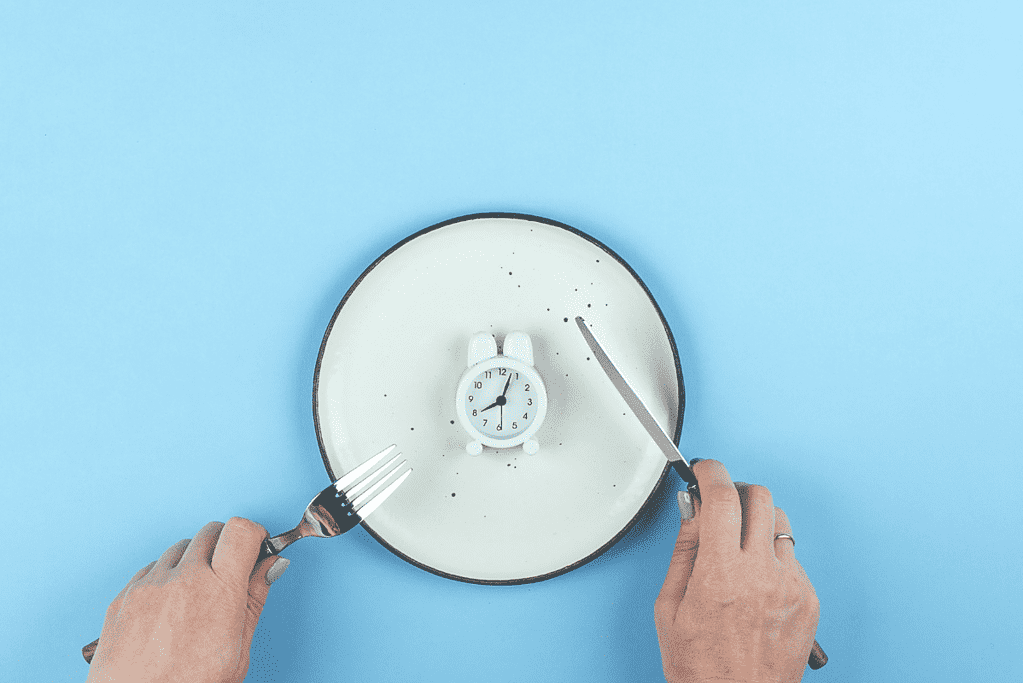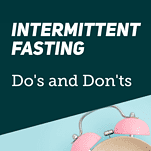According to the International Food Information Council, Intermittent fasting is one of the most popular diets of Americans. In 2020 it was the number one choice, while in 2021 it was number two (after calorie counting). So what is intermittent fasting? What are Intermittent Fasting do’s and don’ts? You’ll get all the information about intermittent fasting
Not surprisingly, according to the council, the top two reasons to follow a diet are to lose weight, followed by protecting long-term health, and prevent future health conditions. Most proponents of intermittent fasting strongly believe that intermittent fasting will help you shed the extra pounds and get or stay healthy.
As an Amazon Associate, I earn from qualifying purchases. Click here for full disclosure.

What is Intermittent Fasting?
Fasting is not new and historically our ancestors usually have fasted for religious or spiritual reasons. What is relatively new is Intermittent Fasting. This type of fasting involves an eating window when you can eat during a particular time and a fasting period when you cannot eat.
Before we talk about the do’s and don’ts of intermittent fasting, let’s take a look at the different methods of intermittent fasting. Your eating window and fasting period vary according to the method of intermittent fasting. There are different types of Intermittent Fasting and these are the most popular:
16/8 Method
The 16/8 method is the most common type of intermittent fasting and the method I use. People who do this type of intermittent fasting fast for 16 hours and eat only during an eight-hour period. For example, if you eat dinner at 6:00 pm you can have your first meal the next morning at 10:00 am. During the eight-hour eating window, you can have two or three meals and even snacks. This is perhaps the easiest type of intermittent fasting for most people to follow or to start with.
5/2 Method
The followers of the 5/2 method eat normally for five days and eat 500 -600 calories for two non-consecutive days a week. For instance, you limit your calories and eat small meals on Tuesdays and Thursdays, but consume your regular diet for the rest of the week. Note, however, there are no studies on the benefits of this specific method.
Eat-Stop-Eat Method
Unlike the 5:2 method, with Eat-Stop-Eat you consume no food on your fasting days. For example, if you finished dinner at 6:30 pm on Tuesday, you will fast for a full 24 hours so you can eat dinner at 6:30 pm Wednesday. Some people do this once or twice a week. Many people find Eat-Stop-Eat difficult and it is usually done by seasoned intermittent fasters.
Alternate Day Fasting
With this method, you fast every other day. Some people fast for a full 24 hours while others eat 500 – 600 calories on the fasting day. Like Eat-Stop-Eat, this is not recommended for first-timers.
The Warrior Diet
Every day, these warriors cycle between periods of little food intake and a very short period of overeating. For example, you can eat small amounts of fruit and vegetables during the day and have a large meal in the evening. This is the first popular diet that included intermittent fasting.
Spontaneous Meal Skipping
As the name implies, followers do not observe a strict schedule but skip a meal from time to time. Some people like this method as it can be an easy introduction to intermittent fasting. You can just choose the meal, perhaps when you are not hungry, to skip.

Health Benefits of Intermittent Fasting
There are some impressive benefits of intermittent fasting from very credible sources. The health benefits of intermittent fasting include:
- decreased insulin levels consequently your body will use energy from fat stores.
- Increased levels of human growth hormone lead to muscle mass growth and bone density.
- Better cognitive and brain health
- Increased energy
- Lower blood pressure
- Reduced inflammation in the body.
- Repaired and regenerated old cells
- Reduced bad cholesterol (LDL) is reduced and increased good cholesterol (HDL)
The New England Journal of Medicine stated that there is accumulating evidence that the 16/8 method of intermittent fasting can decrease diseases, including obesity and cancer; increase longevity and stress resistance.
I am particularly interested in intermittent fasting for weight loss. The concept of intermittent fasting for weight loss is based on the fact that we lose weight when our insulin levels are low. The theory behind Intermittent Fasting is to give our body enough time for our insulin levels to decrease while fasting. Once our insulin levels are low, our body then uses sugar in our stored fat cells for energy. And we lose weight.
According to Harvard University, research on obese rats subjected to intermittent fasting found that they lost weight, lowered their blood pressure, cholesterol, and blood sugar levels. Research on humans also found that they lost weight. But, there is a but. Humans didn’t lose any more weight with intermittent fasting than with any other diet.
However, I think a better comparison is intermittent fasting versus my regular unhealthy diet. Eating a healthy diet, along with 16/8 intermittent fasting, I was able to lose 80 pounds in eight months. And intermittent fasting continues to help me maintain my 80-pound weight loss.
Now that you understand the health benefits, let’s move on to the intermittent fasting do’s and don’ts.

The Do’s and Don’ts of Intermittent Fasting
1. Do Speak To Your Doctor
You should always speak to your doctor before you start any diet. Your doctor knows your medical condition and will be able to, if necessary, customize intermittent fasting for you.
2. Do Pick Your Fasting Schedule
Choose your periods of eating and fasting that will work with your lifestyle. For instance, if you work the graveyard shift your fasting and eating windows will be different from a stay-at-home mom.
3. Do Start Slowly
Sudden changes in your diet can cause negative side effects such as headaches, fatigue, dizziness, and of course hunger. I recommend starting slowly with the 16/8 method. For the first few days or week try a 12-hour fast or even less if your body is used to eating breakfast soon after you wake up.
4. Do Be Consistent
Once you get to your ideal eating window and fasting period, stick to a consistent routine. Like any new habit, consistency is the key to success. Give your body a chance to get used to your new eating habits.
5. Do Drink Water While Fasting
You want to stay hydrated during your fasting window. Also, initially drinking plenty of water will help with hunger. Most fasters drink at least eight glasses of water.
6. Don’t Drink Diet Sodas or Other Drinks with Artificial Sweeteners
For many people, it’s natural to assume that if you can drink water during your fast, you can also drink diet sodas and other drinks with artificial sweeteners. However, ironically artificial sweeteners will only make you hungrier. This is one of the biggest mistakes made by intermittent fasters. Obviously, if the goal is to reduce your insulin level while fasting, these drinks will not be helpful.
7. Do Drink Black Coffee and Unsweetened Tea
In addition to water, feel free to drink black coffee and/or unsweetened tea during your fasting period.
8. Don’t Overeat During Your Eating Window
This should go without saying, but so many of us will overeat and binge during our eating period. If your goal is to lose weight, calories still count. Your eating window is not a Thanksgiving feast!
9. Do Eat Healthy Nutritious Foods
Be sure to include lean proteins, healthy fats, whole grains, whole foods, fruit, vegetables during your periods of eating. I personally find that eating protein and fiber can help to alleviate hunger and leave you satisfied and full.
Also read Best Foods for Permanent Weight Loss
10. Don’t Eat Sugary Foods or Foods High in Salt and Fat
You may be surprised to know that sugary, salty, and fatty foods will not fill you up but will only make you hungrier and want to eat more. You may have experienced this when you eat chips, popcorn, or chocolate.
Also read Worst Foods for Weight Loss
11. Don’t Eat Too Little
Another common mistake of those trying intermittent fasting is not eating enough during your eating window. I can understand the urge to restrict your calories but you need to be sure that your calorie intake is enough for your body. When you don’t eat enough, you are sabotaging your potential loss. You risk slowing your metabolic rate, losing muscle, and even weight gain!
12. Don’t Unknowingly Break Your Fast
To reap the benefits of intermittent fasting, it’s important to fast when you are supposed to and eat when you are allowed. However, remember that we lose weight when our insulin levels are low. But did you know that some medications and supplements containing even a tiny amount of sugar can unknowingly break your fast?
Carefully read labels and watch out for the following:
- Toothpaste and mouthwash with xylitol (a sugar-free sweetener)
- Medications with sugar in the coating, e.g., Advil
- Vitamins containing sugar and fat e.g., gummy bear vitamins
- Supplements containing pectin (usually found in jellies and jams) or maltodextrin (added to improve flavor, thickness, or shelf-life).
13. Do Exercise
Yes, you can exercise while intermittent fasting. You can do low-intensity exercise, low-impact exercises, moderate exercise, and even high-intensity interval training. If you exercise regularly, you should be able to continue with your regular fitness routine.
You can exercise during your eating window, however, it may even be ideal to exercise during your fasting period. You are likely to burn some of your stored fat while exercising. But of course, it’s important to listen to your body. Stop working out if you feel weak, lightheaded, or dizzy.

Intermittent Fasting Rules
Intermittent fasting works for a lot of people, including me, and hopefully, it will help you lose weight or avoid weight gain, by following the above intermittent fasting rules.
This beginner’s guide on the do’s and don’ts of intermittent fasting will help you avoid the common mistakes made by many fasters. You now have the information to start safely and eat nutritious foods during your eating window and avoid hunger and other issues during your fasting window.
I love the fact that you are not on a traditional restrictive diet, but rather on a new eating pattern that you can maintain for as long as you want!
Intermittent fasting might be the start of a healthy lifestyle for the rest of your life!




28 comments
I think I kind of do this. I try to always stop eating by 7PM and I usually don’t eat again until 11 AM. I could never do it during the day. I get cranky if I don’t get real food for lunch and dinner.
Hi Amber, you’re right. You are doing your own version of intermittent fasting and it’s working for you. Keep doing it!
I could do the meal skipping one. I am curious to discover the benefits.
Hello Tara, We are all unique so the only way to know about the benefits for you is to try it. Good luck!
I have seen people fast but have never been fully appreciative of the method. I can see the health benefits when done correctly. Thank you for sharing!
Yes, Louraine, they can be huge benefits of intermittent fasting when done correctly.
I really enjoyed reading this post, I always hear so many things about Intermittent fasting.
Thanks for reading, Tasheena.
I am looking into intermittent fasting, these are all great tips. I have yet to try it just because my schedule is so crazy. But I intend to attempt it eventually.
Hi Kathy, When the time is right for you give intermittent fasting a try!
This would really work for some, but I guess I cannot do this. Being diabetic, the thing I need to watch out for is fluctuations in my blood sugar levels. My daughter would benefit from Intermittent fasting though. She needs to lose some weight. Thanks for sharing your tips and guide on how to be successful with this kind of dieting.
Hi Eileen, You, and anyone with health conditions, should check with your doctor before embarking on a new diet.
This is such a really great post! I enjoy reading this this will surely gonna work on me I would love to try this fasting!
Hi Richelle, let me know if you try intermittent fasting and how it is going for you.
I think I really need to try this thanks for sharing this with us this will surely help me a lot!
Good luck, Rose Ann. I hope intermittent fasting helps you. Let me know how it’s going for you.
Fasting is no joke! Thanks for all the great tips on how to do it right!
You are right, Crystal. Fasting is no joke!
I always try to maintain a balanced diet but my foody characteristic unfortunately never lets me to do thid????
Hi Abida, I know how hard it is to resist all the great food around us. But it can be done.
It’s useful to know there are different ways to do this. I need to try this again. I don’t think I did it for long enough last time to get results. This was really useful. I now know more than I did the first time around which will help x
Hi Melanie, give intermittent fasting another try and see if it will help you. Good luck!
I think that 16/8 fasting is the best choice with the condition that you eat healthy. Only this way it can do miracles.
You are so right, Catalina. You can eat Oreos all day and expect any diet to work for you.
I would love to check it out. Need to loose some weight. After eating eating healthy also weight is gained. Thanks for sharing these tips.
Hi Swathi, yes, unfortunately you can gain weight although you have a healthy diet. Calories and portion control are also important. Maybe intermittent fasting will work for you.
This is very helpful, I’ve gained a lot of weight during this pandemic and I really need to lose them
Unfortunately, I think everyone’s waist line suffered during the pandemic. Try intermittent fasting to see if it will help. Good luck, Sol!